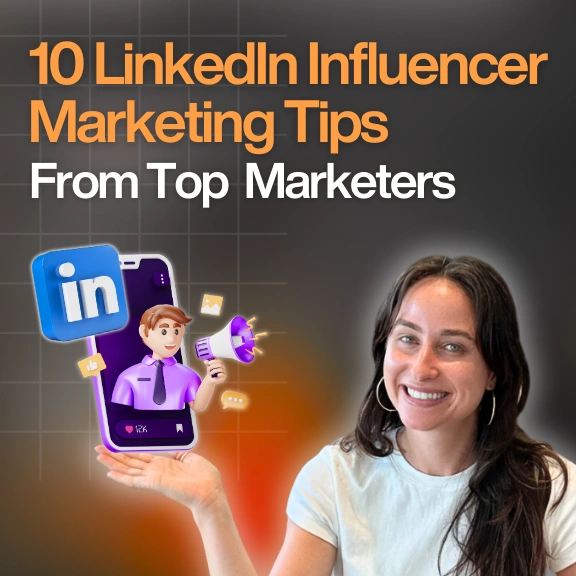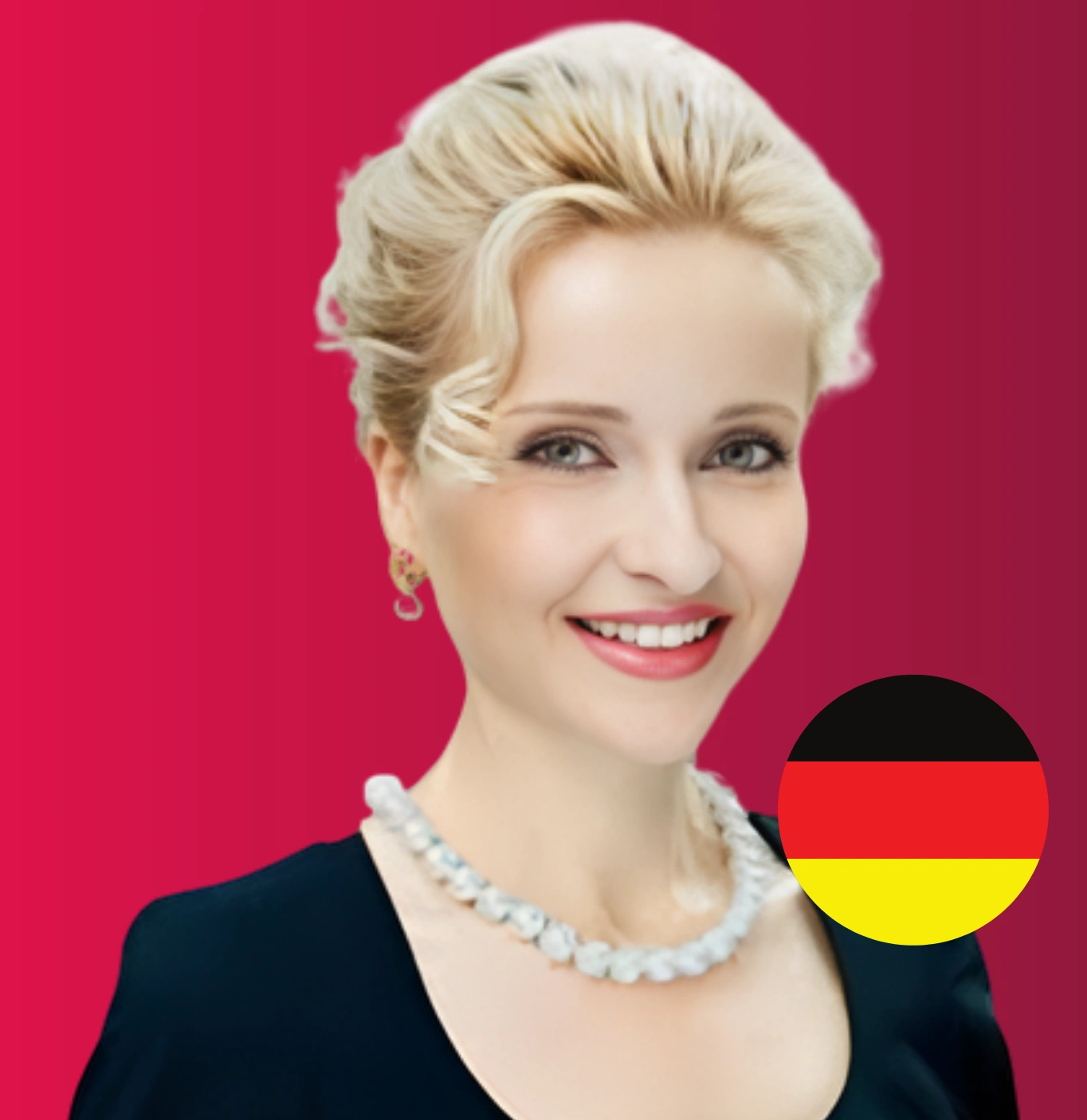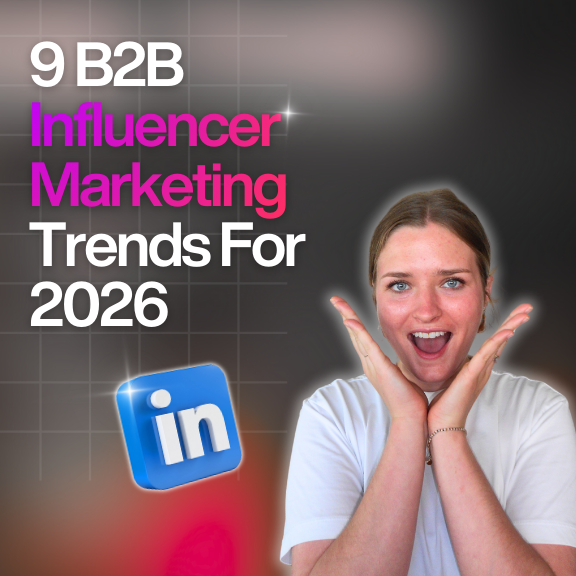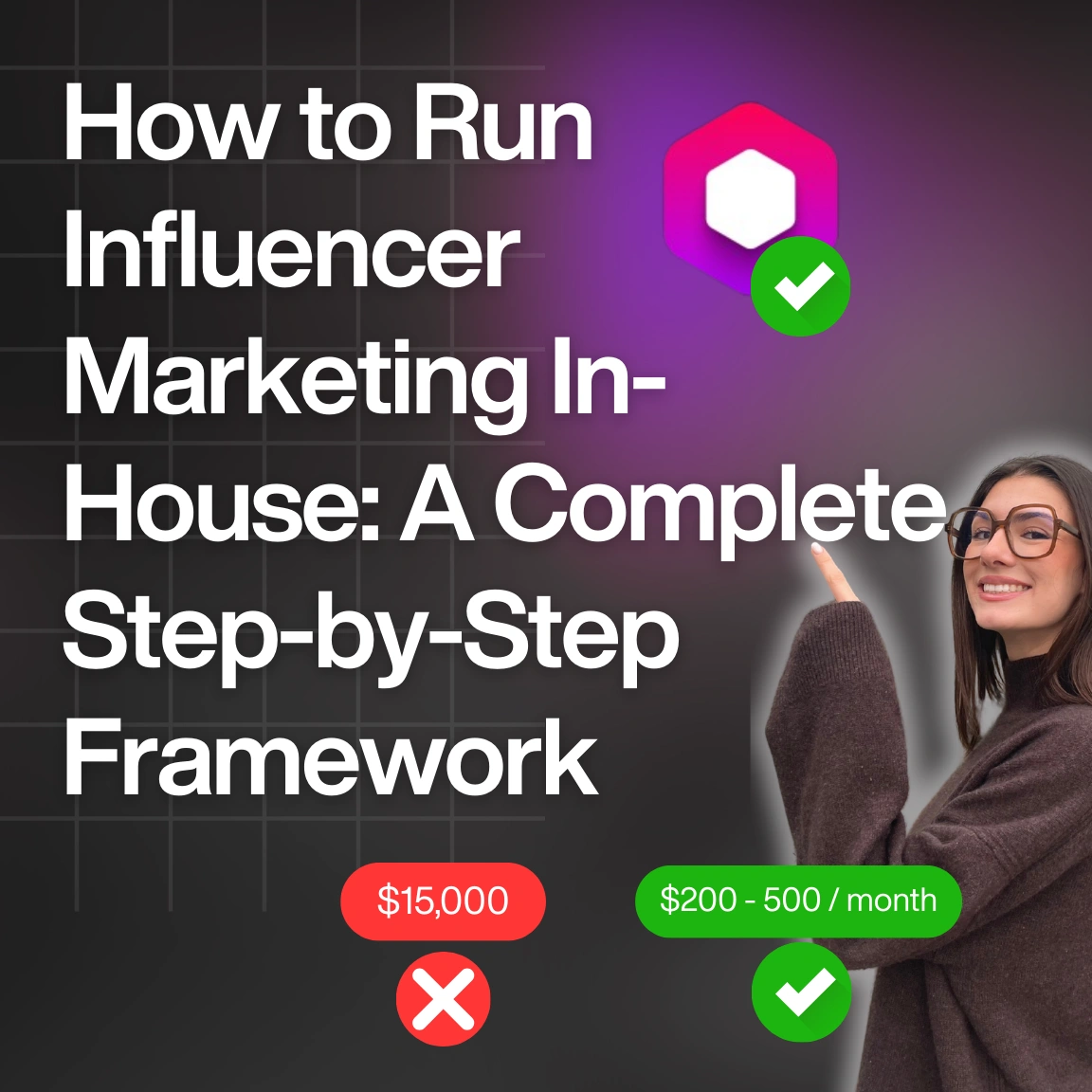Blog & Articles
Your ultimate ressource for the creator economy
Methodology & Rankings
About Favikon, rankings, tools & much more.
Insights
The recipe behind Favikon's viral & coveted rankings.
Free tools to power your influencer marketing workflows.
See Favikon users' success stories.
Get access to all Favikon rankings.
Become a Partner
Become an Affiliate
About the team behind Favikon
The place to talk creator economy, together


Featured Rankings

Here is the Top 50 Rising Video Creators on LinkedIn. Video is quickly becoming the platform’s most powerful format, with creators gaining more reach and engagement than ever. As Gen Z grows its presence and tools like BrandLink and Thought Leader Ads support content creation, LinkedIn is doubling down on video. This ranking, made in partnership with OpusClip, celebrates the creators leading this shift and aims to inspire anyone ready to start sharing through video.

Here is the Top 50 Rising Video Creators on LinkedIn. Video is quickly becoming the platform’s most powerful format, with creators gaining more reach and engagement than ever. As Gen Z grows its presence and tools like BrandLink and Thought Leader Ads support content creation, LinkedIn is doubling down on video. This ranking, made in partnership with OpusClip, celebrates the creators leading this shift and aims to inspire anyone ready to start sharing through video.
The Ultimate Guide to B2B Influencer Marketing in 2025
B2B influencer marketing has become a core part of many business strategies. Instead of focusing on consumers, like in B2C, this approach targets other businesses. It leverages industry experts and professionals to help companies build trust, educate their audience, and generate more qualified leads.



Jérémy Boissinot is the founder of Favikon, an AI-powered platform that helps brands gain clarity on creator insights through rankings. With a mission to highlight quality creators, Jérémy has built a global community of satisfied creators and achieved impressive milestones, including over 10 million estimated impressions, 20,000+ new registrations, and 150,000 real-time rankings across more than 600 niches. He is an alumnus of ESCP Business School and has been associated with prestigious organizations such as the French Ministry and the United Nations in his professional pursuits.
Check Brand Deals
You might picture Instagram stars promoting products when you think of influencer marketing, but B2B is where the real action is. The B2B eCommerce market is huge—5x bigger than B2C!—and that's why more and more B2B companies are working with influencers. In fact, according to a report by Ogilvy, 75% of interviewed B2B marketers are already running B2B influencer campaigns.
What is B2B Influencer Marketing?
B2B influencer marketing is a strategy where businesses collaborate with industry experts, thought leaders, and relevant creators to promote their products, services, or overall brand message within a specific industry. This approach focuses on leveraging the authority and credibility these influencers hold among professional audiences.
Who is a B2B Influencer?

A B2B influencer is someone who has influence in the business world. They might share industry insights, best practices, or innovative ideas. A LinkedIn influencer is someone who uses LinkedIn as their main platform to share their content. Often, these two overlap, but not always.
Brands are moving to B2B influencers now because the market is more mature. Businesses are seeing the value in influencer marketing, not just for consumer products but for business solutions. The pandemic accelerated digital engagement, pushing brands to find new ways to connect with decision-makers online.
B2B creators like Justin Welsh have played a key role in driving the “Personal Branding” movement on LinkedIn. By sharing valuable insights and building their own brands through written content, they’ve inspired many others to do the same. This shift away from traditional image and video-heavy content has encouraged more professionals to produce thought leadership pieces and industry insights. The rise of B2B creators over the past three years has laid a strong foundation for B2B influencer marketing, showing how powerful personal branding can be for businesses and professionals alike.
The Benefits of B2B Influencers
Many people remain skeptical about B2B influencer marketing because they often compare it to the B2C model. But in B2B, it’s not about product placements or going viral. It’s about fostering trust, amplifying expert voices, and sparking meaningful conversations with key decision-makers. The benefits of working with B2B influencers include:
1. Their audience is qualified
One of the main goals of B2B influencer marketing is to generate leads. And unlike B2C influencers, where the audience can be large and difficult to pinpoint, Influencers in a niche industry can reach an audience of decision-makers, such as CEOs, CTOs, and purchasing managers. These are the people who make buying decisions, so working with influencers helps target them directly.

2. B2B Influencers are trusted
Trust is at the heart of B2B marketing. Unlike B2C, where buying decisions can be more emotional and made quickly, B2B buyers take their time. They carefully research options, looking for proof, data, and real-world examples. This is where industry experts and influencers come in—they provide the credibility that businesses seek. Companies trust recommendations from respected voices far more than traditional ads.
What makes B2B influencer marketing so effective is that these influencers are seen as true experts in their fields. Unlike B2C, where audiences may feel overwhelmed by constant brand partnerships, B2B audiences trust their influencers almost entirely. These influencers are followed for their knowledge and expertise. When they endorse a product or service, their audience believes in it because it comes from a trusted, credible source.

This credibility is what makes B2B influencer marketing so powerful. When a LinkedIn creator or industry expert vouches for a service, their audience listens, because trust is the foundation of these relationships. And that trust drives results in B2B marketing, where buying decisions are heavily based on reliability and expertise.
3. B2B Influencers are authentic
In a world full of deep fakes and AI-generated content, people on social media are looking for real, authentic connections. Highly polished commercial videos don’t resonate as much anymore. B2B creators stand out for two reasons: they use their real identity (on LinkedIn), which naturally builds trust, and they don’t rely on partnerships for income. This allows them to be selective with the brands they work with, which means their audience isn’t flooded with sponsored content.
A great example of this is in the SaaS niche. SaaS influencers regularly provide high-quality, valuable content because their audience expects thoughtful and insightful information. Unlike common perceptions of B2B influencers offering generic advice, many focus on providing deep, actionable insights that attract a broad and engaged audience. This focus on expertise and trust is what makes their content so valuable and impactful. By prioritizing quality over quantity in their partnerships, these influencers maintain a level of credibility that resonates strongly in the professional world.

Unlike some B2C influencers with 80% or more of their content being ads, LinkedIn creators typically keep their saturation rate low—around 10-20%. This keeps their content genuine and their audience engaged, making their partnerships far more effective and trustworthy in the end.
4. B2B Influencers are competent
Let’s be real: almost anyone can become a B2C influencer today. With just a smartphone and AI tools, it’s easy to produce content at scale in the creator economy. This makes it tough to stand out on platforms like Instagram or TikTok.
B2B is different. B2B products and services are often complex, whether it’s software, consulting, or hardware. B2B influencers have the expertise to simplify these concepts, breaking down complicated ideas into clear, actionable insights. You can’t fake competence here. They help decision-makers who may not understand all the technical details make informed buying decisions, making the process smoother and more effective.
5. B2B influencers are in every niche
B2B creators have surged over the past 3 years. On Favikon alone, there are over 1M LinkedIn influencers. While people often associate influencer marketing with tech or consumer brands, B2B influencer marketing can work for any industry—even those with offline audiences.
Take John Deere, for example. Known for agricultural equipment, they’ve successfully embraced B2B influencer marketing by hiring Rexford Curtiss as their ‘Chief Tractor Officer’ to lead their TikTok strategy. By using TikTok to engage younger, tech-savvy audiences, they’ve connected traditional farming with modern social media.

This shows that B2B influencer marketing works across industries by tapping into influencers who align with your brand and connect with your audience, regardless of the market. Whether in manufacturing, finance, or agriculture, the right influencer can humanize your brand and build trust.

One of the best ROI in marketing
A study by InfluencerHub found that companies that invest in B2B influencer marketing see a $5.20 return for every $1 spent.
Very few B2B creators are consistently publishing content on platforms like LinkedIn, despite the massive audience of passive consumers. This creates a unique opportunity for brands, as there is far less competition for attention compared to more saturated platforms like Instagram or TikTok. With fewer creators vying for visibility, brands can more easily cut through the noise and reach decision-makers and professionals who are actively seeking valuable insights.
The lack of content saturation also means that the return on investment (ROI) for brands partnering with LinkedIn influencers is particularly high. LinkedIn influencers are often more affordable compared to their counterparts on other social platforms, allowing brands to engage in meaningful, long-term partnerships without breaking the bank. Given the high level of trust and professional expertise associated with LinkedIn creators, brands are able to amplify their message effectively, generating more impactful results at a lower cost.
Finally, the ROI is much better than other traditional channels. Check out this article to find out more.
The Different Types of B2B Influencer Campaigns
You can effectively do B2B marketing on almost any platform today, as long as you understand the decision-makers you’re targeting and where they spend their time online. Each platform offers a different environment and opportunities to engage specific types of professionals:
On LinkedIn
LinkedIn is the most effective platform for B2B influencer marketing due to its professional audience and targeted networking capabilities. - LinkedIn is a very safe place, both for brands and creators. Having their real identity, super targeted and affluent audience makes for an ideal platform for an efficient influencer marketing campaign.(Learn more about the benefits of LinkedIn Influencer Marketing here)
Different types of campaigns work well on LinkedIn:
Sponsored Posts
These posts are paid promotions that appear in the LinkedIn feed. You can collaborate with an influencer to create a post that highlights your product, service, or solution. Sponsored posts target specific audiences, ensuring the right decision-makers see your content.

Series of Posts
A “series of posts” in a B2B influencer marketing campaign involves multiple, strategically planned posts over time. It allows for sustained engagement, helps tell a broader story, and educates the audience about the brand’s product or services. This approach builds trust, strengthens authority, and ensures continued visibility, which is especially valuable for B2B products that require in-depth explanation. Examples include weekly insights, product demos, or educational content, all aimed at helping decision-makers understand how the brand can meet their needs.

Promoted Posts
Promoted posts are similar to sponsored posts but can also be organic content boosted for wider reach. If an influencer creates a highly engaging organic post about your brand or product, you can promote it to extend its visibility to a broader audience.
Content Creation
Influencers can help you create valuable content like articles, whitepapers, or case studies. LinkedIn is ideal for sharing long-form content, making it a great platform to distribute thought leadership pieces crafted by influencers with industry expertise. Creators helping with advisory and content creation is one of the biggest trend in the creator economy (check article).
Post Engagement Campaigns
This type of campaign focuses on boosting interactions like likes, comments, and shares on an influencer’s post about your brand. High engagement not only increases visibility but also signals relevance and trust to LinkedIn’s algorithm, which then amplifies the content across the platform. In fact, a simple comment from an influencer can easily quadruple the reach of a post, as LinkedIn prioritizes content that generates active discussions and interaction. This makes influencer engagement critical in extending your brand’s presence and credibility on LinkedIn.
On X (formerly known as Twitter)
Twitter (now X) has historically been a key platform for B2B influencer marketing, especially in industries like tech, where real-time engagement and quick updates are critical. However, Elon Musk’s acquisition of the platform has led to growing distrust among many influencers. As a result, many have shifted their focus to LinkedIn, which is seen as a more stable and professional environment for B2B content.
That said, X still holds relevance for certain B2B campaigns, particularly those that benefit from real-time interaction, industry updates, and fast-moving discussions. Niche sectors like technology, software development, and crypto still find value in the platform, as it fosters immediate engagement and rapid content dissemination that is difficult to replicate elsewhere. For businesses that thrive on fast-paced conversations or need to tap into breaking news and trends, X remains an important tool.
Promoted Tweets
You can work with influencers to create sponsored posts (Tweets) that promote your product or service to their audience. Twitter’s short, real-time format allows for immediate interaction, making it a good platform for product launches or announcements.

On Youtube
YouTube is an underrated yet highly effective platform for B2B influencer marketing, offering some of the best ROI in the industry. Its long-form video format is perfect for showcasing complex B2B products and services, allowing for detailed demos, tutorials, and case studies that provide clear value to decision-makers.
One of YouTube’s key advantages is its SEO benefits. Videos rank highly in both Google and YouTube searches, driving consistent traffic over time. This helps your content stay visible long after its initial release, providing evergreen value that remains relevant for months or even years.
Additionally, YouTube’s high engagement rates make it a cost-effective way to reach a niche B2B audience. The platform enables influencers to create deeper emotional connections with viewers through visual content, which builds trust and credibility. For B2B buyers, trust is crucial, and video content helps bridge the gap by demonstrating authenticity and expertise in a way that other platforms may struggle to achieve.
Dedicated Video
A dedicated video is a type of B2B influencer marketing campaign where the influencer creates a video entirely focused on your brand, product, or service. The influencer’s content centers around explaining, reviewing, or demonstrating your offering in depth. This format allows for an in-depth exploration of your product’s features, use cases, and benefits, which is particularly useful for B2B products that are often more complex.
Sponsored Video
A sponsored video is when your brand is featured as part of a broader video, but it doesn’t occupy the entire content. The influencer may integrate a short segment (e.g., 30-90 seconds) in the video to introduce your product or service. While the main video might be about an industry trend or topic, the influencer takes time to mention or promote your brand within the context of the larger content.
On TikTok
Like YouTube, TikTok can be a great channel for B2B influencer marketing because of its ability to engage large audiences through short, creative content. While traditionally seen as a platform for younger audiences, TikTok offers a unique opportunity for B2B brands to connect with decision-makers in an informal, engaging way. The platform’s algorithm can quickly amplify content, allowing B2B brands to showcase their products, services, or expertise in a more relatable and human way. Additionally, influencers on TikTok can simplify complex B2B topics through fun, easy-to-digest videos, helping brands reach new audiences and create lasting impressions.

Influencers can bring their notoriety to a Tiktok Brand through their channel. Ross Pomerantz 's video with Clickup in September 2024 is a great example of this.
On Newsletters
Newsletters are an often underutilized but highly effective channel for B2B influencer marketing. They offer a more personalized touch: Collaborating with an influencer who runs a popular newsletter in your industry is an excellent way to get in front of a targeted, engaged audience. The influencer can include a section dedicated to your product or service, backed by their trusted recommendation.
There are multiple newsletter channels used by B2B creators, here are the most successful:
- Substack
- Convertkit
- Beehiiv
- Medium

Sponsored Newsletter
A sponsored newsletter in B2B influencer marketing is when a brand partners with an influencer or industry expert who runs a newsletter, paying to have their product or service featured within it. These newsletters often have a highly targeted and engaged audience, typically consisting of professionals, decision-makers, or industry leaders in a specific niche.

Co-Branded Newsletter:
Some influencers work with brands to co-create newsletters on a particular theme. This format provides long-term exposure and adds credibility since the influencer is endorsing your content regularly. For example, Justin Welsh has partnered with analytics tool Taplio to promote their product in his highly-popular newsletter.

On Podcasts
Podcasts are becoming popular for B2B influencer marketing because they allow influencers to speak directly to niche audiences, often professionals or decision-makers. Influencers can share their expertise and build trust with listeners, making their recommendations more credible and effective. The long-form nature of podcasts also allows for deeper conversations, helping B2B brands connect with potential clients in a more meaningful way.
A common podcast strategy involves sponsoring a segment where the host discusses your product or service. Because podcast hosts often have strong relationships with their listeners, their endorsement can be particularly influential.

On Events
Event Speaking
Before content creation became a thing, event speaking was the primary partnership channel for B2B influencers. The concept was straightforward: brands would invite industry experts to speak at events, conferences, or panels, where they would share their insights and expertise. These influencers, often thought leaders or subject matter experts, would use their platform to lend credibility to the brand while educating the audience. This approach not only positioned the influencer as a trusted voice but also gave the brand a direct association with authority and expertise in its field. Though content creation now offers more scalable options, event speaking remains a powerful way to build relationships, create trust, and showcase deep industry knowledge in front of a highly targeted audience.

Event Get Togethers
‘Brand trips’ are when companies organize exclusive (often luxury) trips for influencers to create content and promote their products. Semrush recently did just that, hosting an Influencer Weekend in London with themed dinners, a branded city bus, and a content creation contest offering a $5k prize. The goal was to strengthen relationships with top marketing creators, foster collaboration, and boost brand visibility.
By connecting directly with influencers, brand trips are an effective way for companies to build long-term partnerships, generate authentic content, and boost brand awareness and credibility in their industry.
The different types of B2B influencers
B2B influencers come in many forms, each with unique ways of reaching and influencing their audience. Here’s a breakdown of the different types and how to distinguish them:
1. Industry Experts and Thought Leaders
These influencers are often highly respected professionals in a particular field with years of experience. They have a deep understanding of their industry and are trusted for their insights. You’ll typically find them publishing articles, speaking at conferences, and sharing valuable insights on platforms like LinkedIn or industry-specific publications.

2. Subject Matter Experts (SMEs)
SMEs are individuals with deep knowledge about a specific aspect of an industry or a technical niche. They might not have a massive following, but their audience is highly targeted and trusts their expertise in solving complex problems.
• Example: A data scientist offering tips on analytics tools for enterprise solutions.
3. Content Creators
These influencers create engaging and informative content—such as blogs, podcasts, or YouTube channels—focusing on niche B2B topics. They often combine their knowledge with storytelling, making complex topics more accessible.
• Example: A podcast host discussing trends in supply chain management.
4. Level Executives
CEOs, CFOs, or other high-ranking executives with a strong social media presence can be powerful B2B influencers. They have firsthand experience with running businesses, making their opinions highly influential among their peers.

5. Micro-Influencers
Though they have smaller followings, micro-influencers in the B2B space often have highly engaged, niche audiences. Their smaller, targeted follower base often leads to higher trust and stronger relationships with their audience.
• Example: A HR manager regularly sharing recruitment best practices with a small but engaged LinkedIn community.
6. Employee Advocates
Employees of a company who actively promote their workplace or its products on social media also serve as B2B influencers. Their content tends to be perceived as authentic and trustworthy because they have firsthand experience with the brand.
• Example: An engineer discussing product innovations at a tech company.
7. Consultants and Advisors
These influencers are often hired for their knowledge and expertise to advise on specific business strategies. Their content may include case studies, webinars, or detailed articles that help brands navigate challenges in their industry.
• Example: A sustainability consultant sharing best practices for eco-friendly manufacturing.
Each of these influencers offers unique advantages depending on your brand’s goals. Some are great for thought leadership and credibility, while others are perfect for deep engagement with niche audiences. Identifying the right type of B2B influencer depends on your industry, target audience, and campaign objectives.
How to collaborate with a B2B influencer?
1. Find the Right Influencers

Use Google search or influencer search platforms like Favikon to streamline your search.
- Here's how to use Favikon to find influencers:
- Sign up and log in to your Favikon account.
- Go to Favikon's "Advanced Discovery" feature.
- Filter by Criteria: Use the filters to narrow down your search based on:
- Niche: Select the travel industry of your choice.
- Location: Target influencers in specific regions or countries.
- Audience Demographics: Filter by age, gender, interests, and other relevant factors.
- Social Media Platforms: Choose the platforms where you want to find influencers (e.g., Instagram, TikTok, YouTube).
- Other Filters: Use filters for follower count, engagement rate, and other metrics.
2. Reach out to the B2B Influencer
Through emails
Most B2B influencers are expected to be contacted by email, as it's seen as the most professional channel.

Through DMs
You can reach out to B2B influencers via direct messages if you’ve established a connection or interacted with them before. However, be cautious—B2B influencers are often overwhelmed with DMs, so your message might get missed. Additionally, many influencers view DMs as unprofessional, so it’s important to approach thoughtfully.
3. The costs of a B2B influencer
Influencers costs can vary greatly, depending on the social media, the format and the quality of the influencer.
On LinkedIn, the top influencers can charge up to 20K a post.
- Micro-influencers: up to 500/post
- Macro-influencers: up to 2K/post
- Mega Influencers: up to 20K/post
Here’s an example for Daniel Ordaz, a B2B influencer from Mexico with 54K followers, and a verified creator on the Favikon platform:

4. How to pay a B2B influencer?
There are many ways to pay a B2B influencer, but here’s a quick summary of each possibility:
1. Pay upfront: You pay the influencer a lump sum before the campaign starts, covering all deliverables.
2. Split payment: Payments are divided into portions, with a percentage paid upfront and the rest paid after deliverables are completed.
3. Affiliate model: The influencer earns a commission based on sales or leads they generate through their unique affiliate link or code.
4. Pay per impressions: Payment is based on the number of impressions (views) the influencer’s content receives, typically calculated in cost-per-thousand-impressions (CPM).
5. Pay per audience: You compensate the influencer based on the size and relevance of their audience, often tied to follower count, engagement rates or the Favikon score.
6. Pay per deliverable: The influencer is paid for each specific piece of content (blog post, video, etc.) they create, rather than an overarching campaign.
7. One-off payment: A one-time payment is made for a single piece of content or campaign, without ongoing commitments.
8. Multi-month contract: The influencer is paid regularly (monthly or quarterly) over a set period for ongoing content creation or promotional work.
9. Pay for association to their brand: You compensate the influencer for aligning your brand with theirs, benefiting from their reputation and audience trust.
10. Pay for exclusivity: The influencer is paid to promote only your brand in a specific niche or category, preventing them from working with competitors.
11. Pay for IP: The influencer is paid for the intellectual property (IP) they create, such as owning the rights to content, designs, or ideas.
12. Exchange value without $$$: Instead of paying money, you offer value in other forms, like free products, services, or experiences that benefit the influencer.
Each method offers flexibility based on the campaign’s goals and the influencer’s preferences.
The Different Challenges of B2B Influencer Marketing
B2B influencer marketing is still relatively new, and many stakeholders are in the early stages of figuring it out. Here are some key challenges to watch out for:
Finding the Right Influencers
In niche B2B industries, finding influencers with the right balance of expertise and audience reach can be tough. These influencers need to have both in-depth knowledge and credibility with their audience, which is often smaller but highly specialized. Favikon is the only influencer marketing software covering extensively B2B influencers. Working with agencies like Creator Authority that focus on B2B influencer marketing can also simplify this process.

Maintaining Authenticity
B2B influencers rely heavily on their expertise and reputation. Audiences look to them for trusted, valuable information. To keep this authenticity, brands should avoid pushing overtly promotional content. Instead, focus on educational content that helps solve problems for the audience. Collaborating with influencers on thought leadership pieces, case studies, or webinars can help build value rather than just pushing products.
Measuring ROI
It’s challenging to measure the return on investment (ROI) for B2B influencer marketing, as it involves long sales cycles and high-value deals. Setting clear KPIs from the start is essential—whether it’s engagement metrics, lead generation, or content shares. Using tools like Favikon, Google Analytics or LinkedIn’s analytics platform can help track the impact of campaigns, but it’s critical to align goals with the influencer’s audience.
Respecting the Law
Influencers must clearly disclose any paid partnerships or sponsored content. This includes using terms like “Sponsored,” “Paid Partnership,” or “#Ad” in a visible way. Failing to disclose sponsored content can lead to penalties from regulatory bodies like the Federal Trade Commission (FTC) in the U.S. or equivalent agencies in other countries. Most B2B influencer campaigns do not respect the rules yet.
Dealing with Fake B2B Influencers
Just like in B2C, there are fake influencers in the B2B space as well. Some influencers use engagement pods to artificially inflate their follower count or engagement numbers. It’s important to vet influencers carefully, looking not just at numbers but at the quality of their engagement. Tools like Favikon can help assess an influencer’s true influence by analyzing their engagement and comments, ensuring they aren’t inflating their numbers with artificial methods. Check out this article to effectively spot fake influencers.
Examples of sSuccessful B2B Influencer Marketing Campaigns in 2025
Tons of influencer marketing campaigns are now taking place every day. Here are a few examples of influencer campaigns taking place in 2025:
HockeyStack’s “The Flow” Comedy Series 2024 - 2025

HockeyStack, a B2B analytics platform, teamed up with influencers Obaid Durrani and Todd Clouser to create “The Flow,” a comedic video series including the popular “Worst Marketer in the World” sketches. Shared across LinkedIn and YouTube, the campaign entertained while subtly showing HockeyStack’s value proposition.
Hootsuite's "Social Media Help Desk" Campaign

Social media management platform Hootsuite partnered with four popular B2B influencers—Jayde Powell, Brandon Smithwrick, Sophie Miller, and Jazmin Griffith—to run a “social media help desk,” providing guidance to social media managers through their comment sections.

Hootsuite gifted the influencers with branded rotary phones and personalized nameplates. The campaign sparked thousands of comments, which the influencers actively responded to.
Miro’s Multi-Platform Template Campaign - 2024

Miro, a collaborative online whiteboard platform, partnered with a diverse group of influencers across Instagram, LinkedIn, and its own Circle community in 2024. The campaign involved influencers like industry experts and productivity thought leaders showing Miro’s templates like Product Vision, Lean Canvas, and UX Case Study templates in real-world professional scenarios. As a result, Miro achieved a click-through-rate of 5%, 6.7%, 10%, and Ccst-per-click dropped to just $0.47.
Clickup with Ross Pomerantz -2024

Clickup leveraged Ross Pomerantz's comedic style to create engaging content of common workplace scenes, all while maintaining a lighthearted tone. This strategy contributed to over 150,000+ organic impressions.
Hootsuite with Tameka Bazile - 2024

To reach social media managers and marketers, Hootsuite launched the #SocialShift campaign, collaborating with influencers like Rachel Karten and Carlos Gil. A distinctive retro newspaper visual unified the campaign. Influencer-driven content, focused on social media mastery contributed to over 400,000 new followers and a 35% rise in demo requests.
Lyoyd George and Lumanu - 2024

Check the full post here
Andrew Bolis and Guidde - 2024

Find the whole thread here
Ready to Start Your B2B Influencer Marketing Campaign in2025?
You can effortlessly streamline your planning and creator selection with Favikon's AI-powered platform, designed to connect you with ideal influencers for genuine collaborations with your B2B brand.
B2B Influencer Marketing: FAQ
What is B2B influencer marketing?
B2B influencer marketing involves businesses partnering with industry experts to promote products or services. This leverages the expert's credibility to reach targeted audiences.
What is the ROI of B2B influencer marketing?
B2B influencer marketing can yield a significant ROI, with reported returns of $5.20 for every $1 invested.
Who is a B2B influencer?
A B2B influencer is a recognized expert in their field who has built a trusted and engaged audience.
Also See 👀
How Much Does It Cost to Hire an Influencer?
Does Influencer Marketing Work? [Examples & Statistics]
How to Reach Out to Influencers: The Only Guide You Need
Related Articles
See all the articlesResources











.png)










